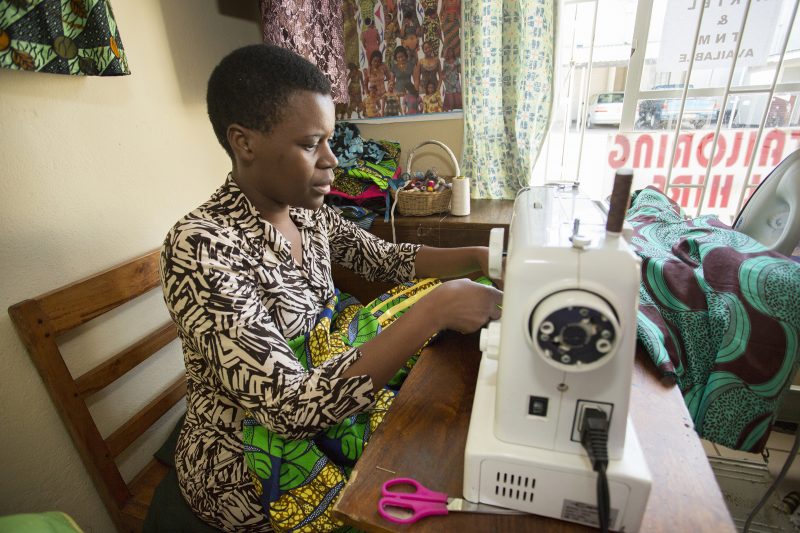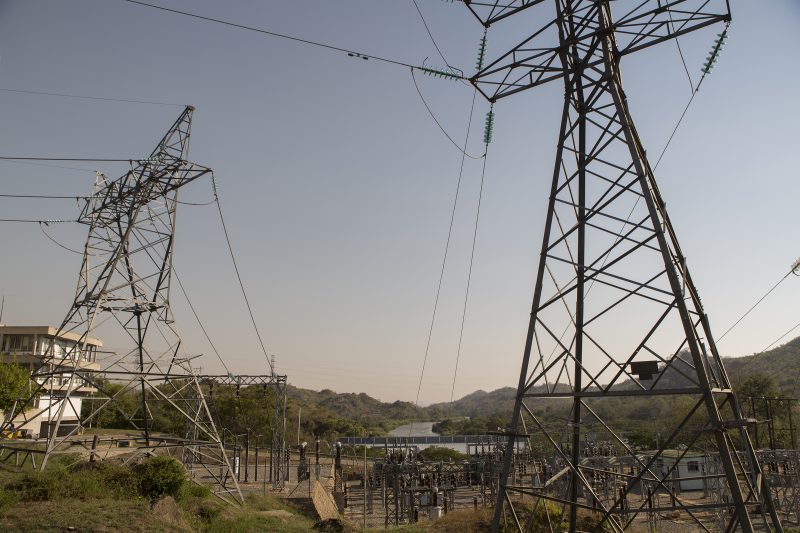In Malawi, where less than 12 percent of the population has access to electricity, the lack of a reliable power supply is a major constraint to economic growth. Malawian firms consistently cite weakness in the electricity sector as one of the major obstacles to doing business. When power cuts out, firms must either shut down or run their own generators at very high costs. Indeed, the buzz of generators is a common background noise in businesses and hotels in Lilongwe, the country’s capital.
Malawi’s situation is not unique. In sub-Saharan Africa, approximately 600 million people — two-thirds of the population — live without electricity. Inadequate, unreliable, and unequal access to power drives up the cost of business, hinders investment, and limits job opportunities, particularly for the poor.

Photo credit: Jake Lyell, MCC
Ivy Namasani makes a dress in her tailoring shop in downtown Blantyre, Malawi. Her store suffers from frequent power blackouts that hamper her ability to do business. As part of the Malawi Compact, MCC is supporting the Government of Malawi in its efforts to strengthen the country’s power sector and deliver reliable electricity to more households, schools, and businesses like Namasani’s.
When MCC signed a compact with the Government of Malawi in 2011, the Electricity Supply Corporation of Malawi Limited (ESCOM), the national electricity utility, was in a weak financial situation and struggling to provide reliable services to its small customer base — much less expand services to the rest of the country. Moreover, ESCOM’s monopoly on electricity supply meant that independent power producers from the private sector could not enter the market to contribute their capital and expertise to help meet the growing demand for electricity.
Today, with MCC’s support, the Government of Malawi is working to create a framework for the country’s power system to grow by modernizing infrastructure and strengthening institutions to expand accessibility while also adopting policies that encourage accountability and private investment.
ESCOM faced a number of long-standing problems that slowed development in the power sector. Transforming ESCOM into a more financially stable and operationally effective company, coupled with much needed policy and legal reforms, has been crucial to strengthening the country’s power sector as a whole.
A combination of restrictive regulations prevented ESCOM from charging prices that accurately reflected the cost of providing service. This was compounded by an over-burdened network and customers’ non-payment of bills, leading to low revenues, which, in turn, resulted in a lack of resources to reinvest in the system. Key activities contributing to ESCOM’s turnaround include:
- Legislation passed by the Parliament of Malawi in 2016 that set the stage for a restructuring of the power market to make it both better governed and more competitive. ESCOM was unbundled into two utilities: the newly created Electricity Generation Company (EGENCO) focuses on electricity generation, while ESCOM focuses on electricity transmission and distribution.
- Tariff reforms to bring revenues more in line with costs, resulting in ESCOM’s improved financial position.
- Stronger operational practices to improve maintenance planning and execution, with ESCOM increasing spending on things like replacing faulty utility poles and critical repairs at hydropower plants.
- Technical assistance and new accounting policies to adhere more closely to international financial standards and implement information technology solutions to better manage inventories.
- Installation of pre-paid meters and removal of illegal connections to reduce non-collection and non-technical losses from electricity theft.

Photo credit: Jake Lyell, MCC
Repairs at the aging Nkula A hydropower plant are among critical infrastructure investments being undertaken as part of MCC’s Malawi Compact. These investments, along with technical assistance and support for policy and legal reforms, are helping to improve service delivery and open up new opportunities for business participation in this vital sector.
Going forward, ESCOM plans to apply for a new tariff to fully reflect its cost of service and to help ensure that the utility has the financial means to support work needed to maintain and expand its network. As the Government of Malawi clarifies guidelines for doing business with ESCOM, more independent power producers are expected to enter the market. The African Development Bank, which has commended Malawi’s power sector reforms, also plans to invest in the country’s power sector.
These challenging reforms have fueled great progress in establishing a healthier power sector and expanding opportunity for the people of Malawi. By strengthening this vital sector, the Government of Malawi is building a foundation for the delivery of reliable electricity to more households, schools, and businesses to power the country’s long-term economic growth and reduce poverty.

